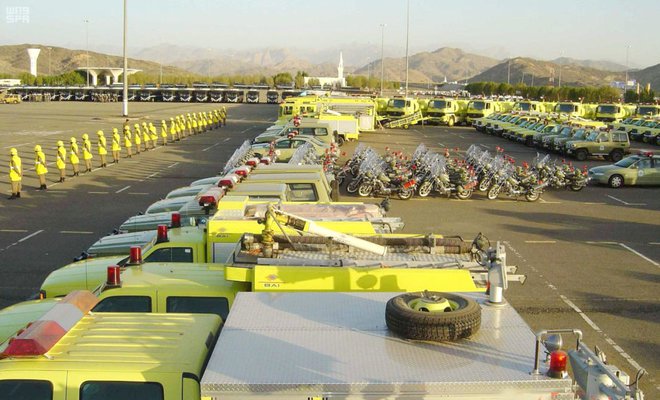
Saudi Civil Defense says 17,000 personnel deployed to serve Hajj pilgrims
The General Directorate of Civil Defense in a press conference yesterday announced the designation of more than 17,000 highly trained personnel, supported by 3,000 advanced vehicles, to provide pilgrims with the highest levels of safety during Hajj.
Maj. Gen. Hamad Al-Mubaddel, director of the Civil Defense for Hajj, confirmed that forces have been deployed to all sacred sites and that they are fully prepared to carry out the directorate’s plan for Hajj in cooperation with 32 government bodies. He also noted the introduction of new technology and digital maps of the sacred sites.
Brig. Gen. Hamoud bin Sulaiman Al-Faraj, director of the Civil Defense in Mina, explained the importance of the basic pillars of the plan, such as the preventive side, through analysis of past data and geological surveys of problematic areas.
Al-Faraj stressed the importance of deploying field teams and preventive supervision posts in suitable areas for easy movement and swift arrival at target locations.
Moreover, Brig. Gen. Abdullah Al-Hammad, director of the Civil Defense in Arafat, said that civil defense conducts round-the-clock observation of the area.
Brig. Gen. Ali Al-Muntashiri, director of the Civil Defense in Makkah, remarked that they work in accordance with a detailed annual plan that consists of three main parts, including the operational and preventive plans. As for Madinah, Col. Khalid Al-Juhani, spokesman for the directorate in the region, said that the plan is divided into two phases: Before and after Hajj.
Responding to reporters’ questions, Al-Mubaddel said that Civil Defense services are developing all the time, and new elements are added every year based on past experiences and studying new challenges, in cooperation with all participating authorities.
Other Civil Defense officers covered various important points, such as the inspection of pilgrims’ residences, the deployment of rapid intervention teams and crowd management.



























